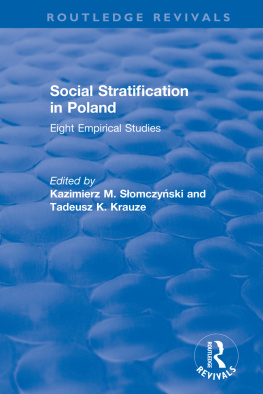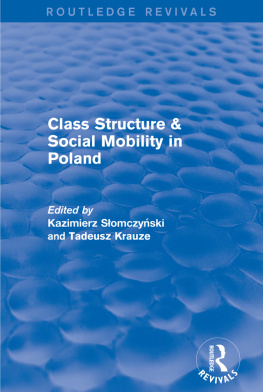SOCIAL STRATIFICATION IN POLAND
Eight Empirical Studies
SOCIAL STRATIFICATION IN POLAND
Eight Empirical Studies
Edited with an introduction by
Kazimierz M. Somczyski
and Tadeusz K. Krauze
With a foreword by Gerhard Lenski
First published 1986 by M.E. Sharpe
Reissued 2018 by Routledge
2 Park Square, Milton Park, Abingdon, Oxon OX14 4RN
711 Third Avenue, New York, NY 10017, USA
Routledge is an imprint of the Taylor & Francis Group, an informa business
Copyright 1986 by Taylor & Francis
Published simultaneously as vol. xvi, no. 1-2 of International Journal of Sociology .
Translated by Ray Taras
No part of this book may be reprinted or reproduced or utilised in any form or by any electronic, mechanical, or other means, now known or hereafter invented, including photocopying and recording, or in any information storage or retrieval system, without permission in writing from the publishers.
Notices
No responsibility is assumed by the publisher for any injury and/or damage to persons or property as a matter of products liability, negligence or otherwise, or from any use of operation of any methods, products, instructions or ideas contained in the material herein.
Practitioners and researchers must always rely on their own experience and knowledge in evaluating and using any information, methods, compounds, or experiments described herein. In using such information or methods they should be mindful of their own safety and the safety of others, including parties for whom they have a professional responsibility.
Product or corporate names may be trademarks or registered trademarks, and are used only for identification and explanation without intent to infringe.
Publisher's Note
The publisher has gone to great lengths to ensure the quality of this reprint but points out that some imperfections in the original copies may be apparent.
Disclaimer
The publisher has made every effort to trace copyright holders and welcomes correspondence from those they have been unable to contact.
A Library of Congress record exists under LC control number: 85018387
ISBN 13: 978-1-138-03760-1 (hbk)
ISBN 13: 978-0-873-32361-1 (pbk)
ISBN 13: 978-1-315-17781-6 (ebk)
Table of Contents
Guide
The editors thank the Institute of Sociology of the University of Warsaw for providing a leave to Kazimierz M. Somczyski which enabled him to work on this volume. They are also grateful to the Institute of Philosophy and Sociology of the Polish Academy of Sciences for being a host to Tadeusz K. Krauze during his several visits to Warsaw, to Hofstra University for partially releasing him from teaching obligations, and to the International Research and Exchanges Board (IREX) for providing him with travel grants. Jerzyna Somczyska and Robin Krauze are thanked for continuous aid in the preparation of this volume.
K.M.S. and T.K.K.
In recent years, the American press and American television news have been filled with stories from Gdask, Warsaw, Krakw, d, and other Polish cities and towns. During this period, the names of a number of Polish leaders have become almost as familiar to Americans as the names of their own leaders, and the word "Solidarity" has acquired an important new meaning for Americans as well as Poles.
Unfortunately, however, this interest of the American public has not been matched by corresponding interest from American sociologists. Polish society is seldom mentioned either in our major scholarly journals or in the textbooks written for our students.
This lack of interest in Polish society on the part of American sociologists reflects, of course, the general disinterest in societies other than our own. As Everett Hughes (1961) observed nearly a quarter of a century ago, American sociology has become an "ethnocentric sociology." It has lost its enthusiasm for the kind of comparative analysis that was central to the work of the founders of the discipline and that gave substance to their writings.
The neglect of Polish society is especially unfortunate at the present time, since Poland is part of the socialist bloc of societies and has, since the end of World War II, been a testing ground for numerous ideas derived from Marxist theory. In view of the growing tendency of American sociologists to regard Marx as one of the founders and most important and innovative theorists of our discipline, one might suppose that this would ensure a lively interest in socialist societies, especially one in which sociological research is as vigorous as it is in Poland.
Poland has a long and rich tradition of sociological research and writing dating back to the nineteenth century. This tradition was interrupted briefly during the German occupation in World War II and in the early years following the establishment of the present Marxist regime. But as early as 1956, restrictions began to be lifted and sociological research and writing were able to resume.
Viewed from an American perspective, this new era of Polish sociology has been remarkable for its vitality, and also for its intellectual independence, objectivity, and freedom from ideological cant. In all these respects, the contrast between Polish sociology and Soviet sociology has been quite remarkable. While much of the credit for this is obviously due to political differences between the two societies, some of the credit is also due to the leadership provided by a number of key individuals, such as Stanisaw Ossowski, Jan Szczepaski, Stefan Nowak, and Wodzimierz Wesoowski.
As Somczyski and Krauze explain in their introduction to this volume, since 1964 the Institute of Philosophy and Sociology of the Polish Academy of Sciences has sponsored, under the leadership of Wesoowski, a series of large-scale research projects dealing with questions of stratification and inequality. This is both an important subject and a sensitive one in socialist societies, since the findings of projects such as these have political, as well as scholarly implications.
Students of stratification everywhere will be forever indebted to the men and women who have created the now substantial store of information concerning inequality and its consequences in a socialist society. Their work provides us with a rich body of data that we, as well as they, can use to test some of the most important ideas in our discipline.
Polish sociology is also important because geographical and historical circumstances have forced Polish sociologists to wrestle with basic questions of theory and method to a much greater degree than many of the rest of us. In particular, they have been forced by circumstances to deal with the contradictions within and between the Marxist and the functionalist traditions. In the process, they seem to have created, or to be in process of creating, a novel synthesis of their ownyet one that can prove of benefit to sociologists everywhere. Thanks to their publications, those of us who have not shared their experiences are still able to benefit from them.
Fortunately for American sociologists, much of modern Polish sociology is available in English. At an early date, our Polish colleagues recognized the importance of translation and established the Polish Sociological Bulletin, a journal that has published translations of important papers in English for more than twenty years. In addition, many other interesting papers and monographs have been made available in translation. Some of them have been published in Poland (e.g., Allardt and Wesoowski, 1978), while others have been published abroad (e.g., Staniszkis, 1983, or Somczyski and Krauze, 1978). The present volume is a good example of this tradition, and provides a rich and valuable sample of contempory research in the field of stratification.











